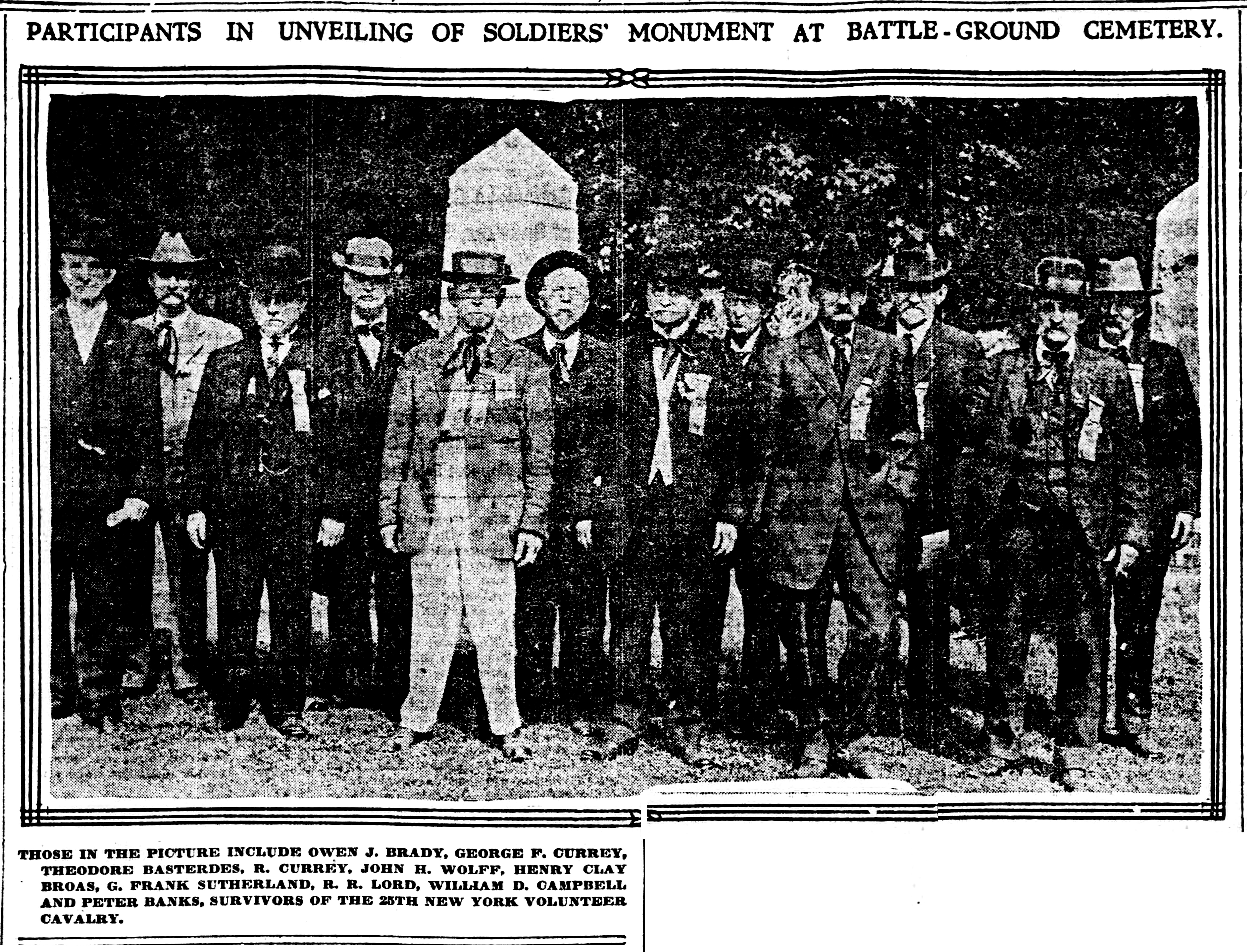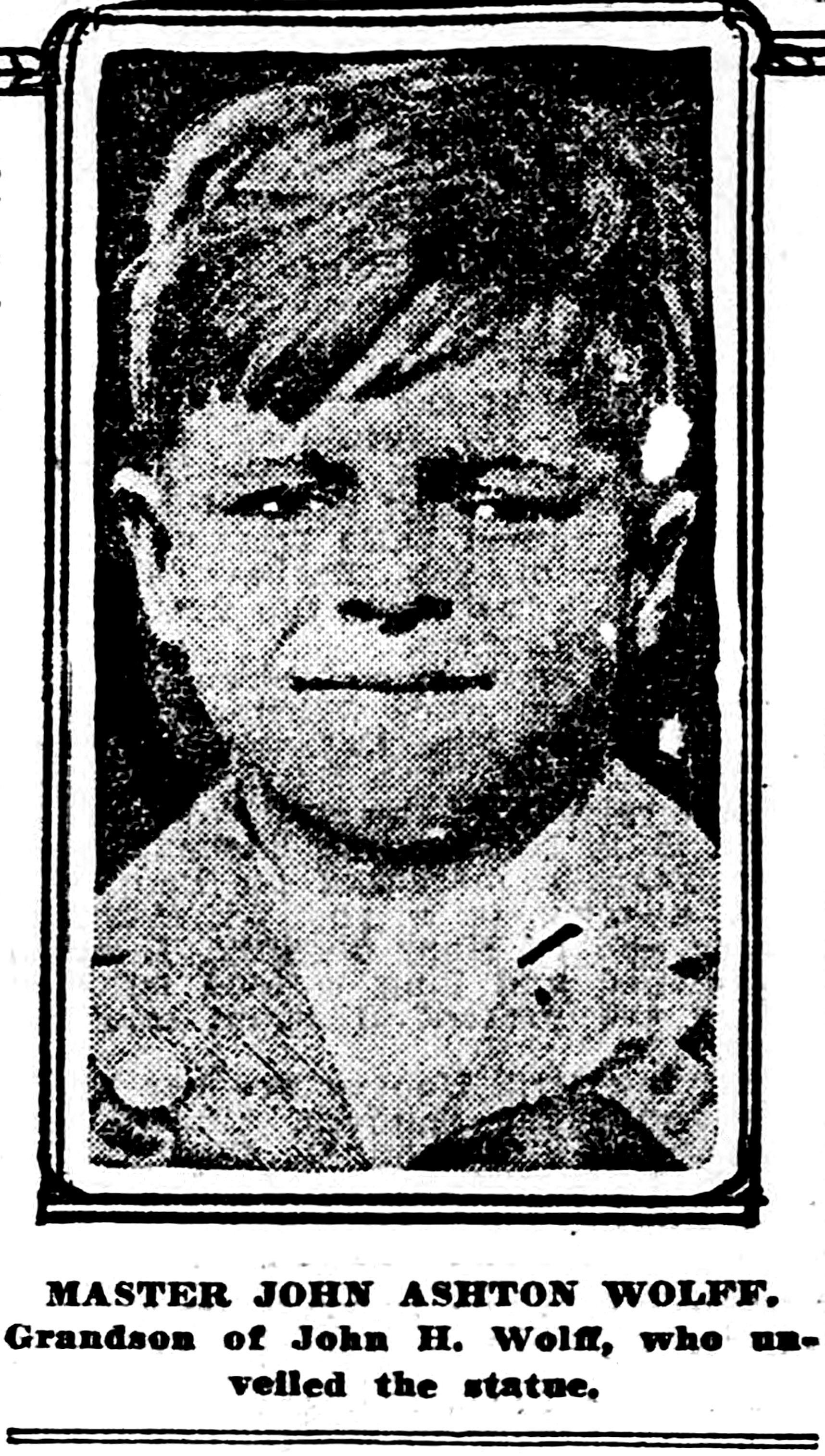The Washington Sunday Evening Star, Sunday September 20, 1914.
Savers of Capital Recall Days of '64

Those in the picture include Owen J. Brady, George F. Curry, Theodore Basterdes, R. Currey, John H. Wolff, Henry Clay Broas, G. Prank Sutherland, R. R. Lord, William D. Campbell and Peter Banks. Survivors of The 25th New York Volunteer Cavalry.
Survivors of 25th New York Volunteer Cavalry Have Reunion Here.
LISTEN TO ADDRESSES AT CONTINENTAL HOTEL
First Time They Had Met Since the Battle at Fort Stevens.
In the glow of the evening's campfire, this time not builded from logs gathered from the battlefield, but represented by the modern electric light, ten lone veterans, survivors of the 15th New York Volunteer Cavalry, whose gallantry was responsible for preventing the capture of Washington July 11, 1864, gathered last night at the Continental Hotel, pulled forth their pipes, talked over the old times and disbanded to meet here again next year with the Grand Army of the Republic. These veterans were Owen J. Brady, New York; George F. Currey, New York; Theodore Basterdes, Marlboro, Mass.; R. Currey, Drainsvllle, N.Y.; John H. Wolff of this city, Henry Clay Broas, G. Prank Sutherland, Hackensack, N. Y.; R. R. Lord, Ofton, N. Y.; William D. Campbell, Columbia, Pa.; and Peter Banks, Long Island, N. Y. Until they clasped hands yesterday at the unveiling of the monument to the 25th New York Cavalry at the Battle Ground cemetery on Georgia avenue, above Brightwood, it was the first time they had met since the battle at Fort Stevens, when, alone, the 25th New York held back Early's forces, superior in numbers, for several hours pending the reinforcement by the 6th Army Corps.
Both the blue and gray joined hands yesterday afternoon in paying tribute to the gallant 25th joined as “friends forever,” as Gen. J. Floyd King, C. S. A., Gen. Early's chief of artillery, put it in the course of his address, a remark which brought forth cheers to evidence the healing of the differences of the sixties.

Master John Ashton Wolff
Grandson of John H. Wolff, who unveiled the statue.
Went Over Battlefield.
When the monument had been unveiled, the speakers had concluded and the benediction had been pronounced, the handful of survivors of the 25th New York “fell in” and were photographed abreast the monument of granite which will stand as a mute reminder of the fighters who resisted Confederate occupation of the capital. And then they went over the old battlefield in a leisurely manner, the first chance some of them had had to go over it since they contested every foot of the area when hard pressed by Gen. Early's numerically superior forces.
The action of the forces in and around Washington which led to the battle at Fort Stevens, July 11. 1864, was [traced] by the speakers yesterday afternoon, and not one of them failed to give the credit for the able defense of the capital to the 25th New York Volunteer Cavalry. Gen. F. W. Whitaker, who commanded the northern cavalry, traced the work of the cavalry throughout the campaign.
The speeches were full of reminiscences of the battle of Fort Stevens. Gen. King denied the reports that Gen. Early had anything like the forces with which he was credited with having. He had only 10,000 soldiers, but they were all seasoned soldiers. High tribute to Early as a soldier was paid by Gen. King.
Recognized Lincoln.
In the fight at Fort Stevens, Gen. King said, he remembered seeing a silk hat in the distance and he recognized Lincoln, and instantly several of the veterans in the audience nodded and each declared: “I saw him, too.”
Maj. J. F. Carter told how the 25th saved Washington and how the carbines saved the 25th. When they opened fire with these then new rifles he said, Gen. Early thought the 6th Army Corps had arrived.
Lewis Cass White of this city called to the attention of those present that the battle of Fort Stevens was the only battle in the District of Columbia of the 500 battles of the civil war.
When the ceremonies at the cemetery were over yesterday the ten veterans gathered around an elderly negro woman, a relic of the slavery days. She was giving some of her reminiscences, and was asking the veterans “who stole my beef and beans.”
“I would know the man if I should see him,” she remarked, with an accompanying laugh. None of the veterans would admit taking the meat, but they did admit that they had eaten some of it.
Savers of Capital Recall Days of '64, The Washington Sunday Evening Star, September 20, 1914, Page 1.(PDF)